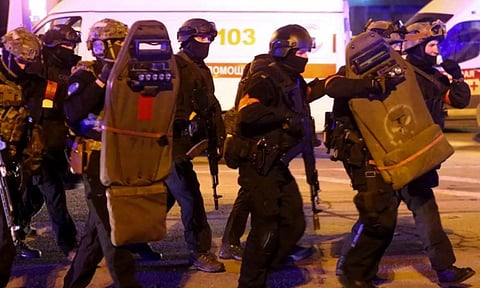

DAVID EHL
UNITED STATES: Intelligence agencies are secretive, gathering information to bolster national security or help their governments make political decisions. To do so, they sometimes even spy on allies. The National Security Agency (NSA) in the United States, for example, spied on German Chancellor Angela Merkel’s phone for several years — a fact the US would have preferred had never come to light. In other situations, intelligence agencies are more open to sharing what they know. On February 23, 2022, for example — the eve of the war in Ukraine — the United States informed Germany and other European allies of intelligence it had about Russia’s imminent invasion. A few weeks ago, the US even shared intelligence with Russia — hardly an ally — warning of a potential terror attack in Moscow in the coming days.
On March 7, the US Embassy in Moscow warned US citizens in Russia that “extremists have imminent plans to target large gatherings in Moscow, to include concerts,” and advised Americans to “avoid large gatherings over the next 48 hours.”
Though the suspected Islamist attackers did not strike for another 15 days, the warning was nevertheless prescient — Friday’s attack targeted a Moscow concert venue, Crocus City Hall, and left at least 139 people dead. After news of the attack broke, White House National Security Council spokesperson Adrienne Watson referred to the US Embassy warning, saying, “The US government also shared this information with Russian authorities in accordance with its longstanding ‘duty to warn’ policy.”
Further details, such as those related to this intelligence’s source, remain unknown. Two senior Russian intelligence officials later alleged they had information showing the involvement of Ukrainian, US or British involvement at some level in the attack. Asked how seriously Russia had taken the US warnings, Peter Neumann, a terrorism researcher at King’s College London, said not seriously enough. Neumann pointed out that Russian President Vladimir Putin dismissed the warnings as propaganda.
“He basically said this [warning] was some kind of psychological warfare operation designed by the US to throw him off, and he didn’t take it seriously at all,” Neumann told German public broadcaster Deutschlandfunk. Although the United States is not a party to the war in Ukraine, it considers Russia a threat to its security — Putin regularly levels public threats against the US. “I assume the US made this [terror] warning public because it probably stopped cooperating with Russian intelligence agencies,” said Michael Gotschenberg, a terrorism expert at German public broadcaster ARD.
“Nations always warn each other about imminent or planned terrorist attacks via their intelligence agencies when they learn about them,” Gotschenberg told DW. “This used to be the case with Russian intelligence agencies as well, yet I assume cooperation has ended due to the fact that Russia is waging a war against Ukraine.”
Terrorist groups such as Islamic State (IS) offshoot Islamic State Khorasan Province (ISIS-K), operate internationally, as recent attacks in Russia, Iran and Afghanistan show. Ensuring public safety makes it imperative that national intelligence agencies cooperate. “Western intelligence agencies consistently share information with each other, tips are passed on and processed by the respective investigating authorities,” Gotschenberg told DW. “These tips often turn out to be nothing, but officials do investigate and arrest suspects when they find something.”